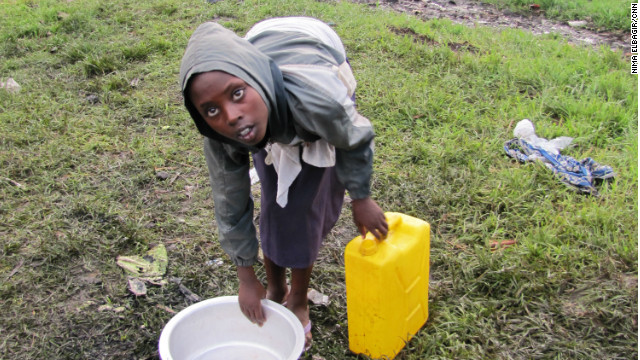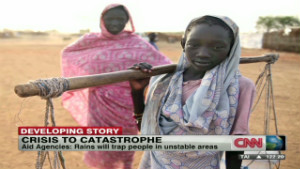May 18, 2012 -- Updated 1518 GMT (2318 HKT)

Congolese refugees stream into Rwanda
STORY HIGHLIGHTS
- Refugees flee Fighting between Congolese government and rebel loyalists
- Rwanda refugee camp was unprepared to deal with the numbers of people arriving
- People are sleeping on floors as workers try to build more quarters
- Fighting started after Congo government began a hunt for a former rebel leader
Tumsifu and her family stuck it out until she finished the exams. Then they fled.
They followed thousands
of others making their way from their homes in North Kivu in the
Democratic Republic of Congo into the Nkamirah Transit Camp across the
border in Rwanda.
After three years of
fragile peace, the government of Joseph Kabila last month announced its
intention to capture Bosco Ntaganda, a notorious warlord who calls
himself "the terminator" and has been charged by the International
Criminal Court with war crimes including the slaughter of civilians.
Ntaganda had agreed to
allow forces of his National Congress for the Defence of the People
(CNDP) to be absorbed into the national army -- a deal Kabila called a
"linchpin" for restoring stability that quickly fell apart.

Struggling for survival in South Sudan
Thousands of Ntaganda's fighters defected and then began clashing with the army to thwart the hunt for Ntaganda.
Tens of thousands of
civilians were forced to leave their homes as their towns became
warzones. Some fled to Goma in North Kivu, some to Uganda and some to
Nkamirah.
Anouck Bronee, representing several U.N. agencies working on this emergency, said the influx was felt almost instantly.
"It started on April 27. From the Friday evening we went from 50 to 190 to 2,000 within three days."
Aid agencies have tried to make life for the refugees as comfortable as possible but the center is already over capacity.
"The first challenge
that we had to contend with was shelter. The transit center could
accommodate a maximum of 2,600 individuals. We've had to do a lot of
rehabilitation and reconstruction as well as rehabilitation of
additional structures that weren't part of the center," Bronee added.
Anouck Bronee showed us an old milk factory where some of the new
arrivals had been housed. Dusty and soot covered, some families had even
set up home inside the rusting machinery.
Nima Elbagir
Nima Elbagir
Bronee showed us an old
milk factory where some of the new arrivals had been housed. Dusty and
soot covered, some families had even set up home inside the rusting
machinery.
It's far from ideal but at least it is shelter from the lashing rain.
And the refugees keep coming.
It's not just the
violence they are fleeing. Young men here told CNN that Congolese army
soldiers had attempted to forcibly recruit them.
Samuel Nsanzamahoro said
that when the battles started coming closer to his home town of
Gicanja, soldiers began picking up young men and girls at random,
accusing them of being army defectors.
"They were taken by force," he said. "Young men and especially young girls."
Samuel is 22, but many
others we spoke to were much younger. Out of fear for their security
they declined to be identified or directly quoted.
Samuel said he's not
afraid of fighting in the government ranks but he does fear the abuses
such recruits are subjected to. He did not elbaorate
Congolese military and
government officials could not be reached for comment, but in the past
have denied accusations of forcibly recruiting civilians.
Bronee said the Rwandan
government has identified a site in the south of the country where it
hopes to move the refugees as soon as a new camp is readied, but as the
violence continues many worry the growing refugee numbers will create a
serious burden for Congo's neighbors.
Rwanda already hosts
nearly 60,000 refugees, many a legacy of the last time Ntaganda and his
forces clashed with government forces.
The 1998-2003 war in
Congo is sometimes called Africa's World War as fighting and refugees
crossed borders, destabilizing the region.
So it's no wonder this new violence is worrying its neighbors.
More worrying still is the fate of the thousands the U.N. says are trapped inside the Congo, unable to escape the violence.
As difficult as conditions are in the Nkamirah camp, at least they feel safe.
<object width="416" height="374" classid="clsid:D27CDB6E-AE6D-11cf-96B8-444553540000" id="ep"><param name="allowfullscreen" value="true" /><param name="allowscriptaccess" value="always" /><param name="wmode" value="transparent" /><param name="movie" value="http://i.cdn.turner.com/cnn/.element/apps/cvp/3.0/swf/cnn_416x234_embed.swf?context=embed_edition&videoId=international/2012/05/15/pkg-elbagir-congolese-refugees.cnn" /><param name="bgcolor" value="#000000" /><embed src="http://i.cdn.turner.com/cnn/.element/apps/cvp/3.0/swf/cnn_416x234_embed.swf?context=embed_edition&videoId=international/2012/05/15/pkg-elbagir-congolese-refugees.cnn" type="application/x-shockwave-flash" bgcolor="#000000" allowfullscreen="true" allowscriptaccess="always" width="416" wmode="transparent" height="374"></embed></object>
<object width="416" height="374" classid="clsid:D27CDB6E-AE6D-11cf-96B8-444553540000" id="ep"><param name="allowfullscreen" value="true" /><param name="allowscriptaccess" value="always" /><param name="wmode" value="transparent" /><param name="movie" value="http://i.cdn.turner.com/cnn/.element/apps/cvp/3.0/swf/cnn_416x234_embed.swf?context=embed_edition&videoId=international/2012/05/15/pkg-elbagir-congolese-refugees.cnn" /><param name="bgcolor" value="#000000" /><embed src="http://i.cdn.turner.com/cnn/.element/apps/cvp/3.0/swf/cnn_416x234_embed.swf?context=embed_edition&videoId=international/2012/05/15/pkg-elbagir-congolese-refugees.cnn" type="application/x-shockwave-flash" bgcolor="#000000" allowfullscreen="true" allowscriptaccess="always" width="416" wmode="transparent" height="374"></embed></object>


No comments:
Post a Comment